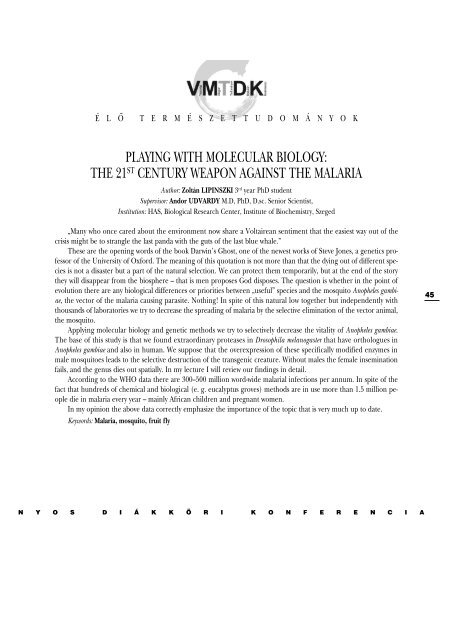Rezümékötet 2008. - vmtdk
Rezümékötet 2008. - vmtdk
Rezümékötet 2008. - vmtdk
You also want an ePaper? Increase the reach of your titles
YUMPU automatically turns print PDFs into web optimized ePapers that Google loves.
É L Õ T E R M É S Z E T T U D O M Á N Y O K<br />
PLAYING WITH MOLECULAR BIOLOGY:<br />
THE 21 ST CENTURY WEAPON AGAINST THE MALARIA<br />
Author: Zoltán LIPINSZKI 3 rd year PhD student<br />
Supervisor: Andor UDVARDY M.D, PhD, D.sc. Senior Scientist,<br />
Institution: HAS, Biological Research Center, Institute of Biochemistry, Szeged<br />
„Many who once cared about the environment now share a Voltairean sentiment that the easiest way out of the<br />
crisis might be to strangle the last panda with the guts of the last blue whale.”<br />
These are the opening words of the book Darwin’s Ghost, one of the newest works of Steve Jones, a genetics professor<br />
of the University of Oxford. The meaning of this quotation is not more than that the dying out of different species<br />
is not a disaster but a part of the natural selection. We can protect them temporarily, but at the end of the story<br />
they will disappear from the biosphere – that is men proposes God disposes. The question is whether in the point of<br />
evolution there are any biological differences or priorities between „useful” species and the mosquito Anopheles gambiae,<br />
the vector of the malaria causing parasite. Nothing! In spite of this natural low together but independently with<br />
thousands of laboratories we try to decrease the spreading of malaria by the selective elimination of the vector animal,<br />
the mosquito.<br />
Applying molecular biology and genetic methods we try to selectively decrease the vitality of Anopheles gambiae.<br />
The base of this study is that we found extraordinary proteases in Drosophila melanogaster that have orthologues in<br />
Anopheles gambiae and also in human. We suppose that the overexpression of these specifically modified enzymes in<br />
male mosquitoes leads to the selective destruction of the transgenic creature. Without males the female insemination<br />
fails, and the genus dies out spatially. In my lecture I will review our findings in detail.<br />
According to the WHO data there are 300–500 million word-wide malarial infections per annum. In spite of the<br />
fact that hundreds of chemical and biological (e. g. eucalyptus groves) methods are in use more than 1.5 million people<br />
die in malaria every year – mainly African children and pregnant women.<br />
In my opinion the above data correctly emphasize the importance of the topic that is very much up to date.<br />
Keywords: Malaria, mosquito, fruit fly<br />
N Y O S D I Á K K Ö R I K O N F E R E N C I A<br />
45




